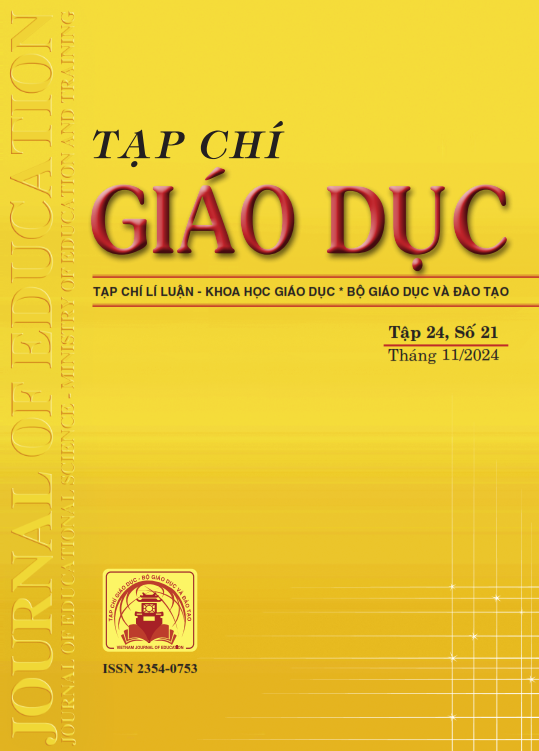Vận dụng một số kĩ thuật dạy học phù hợp với phong cách học tập trong dạy học đọc hiểu văn bản văn học ở trường phổ thông
Tóm tắt
Literary texts are important content in teaching reading comprehension in Literature. However, the current teaching practice shows that not many students are interested in the content, so their reading comprehension skills of literary texts have not been sufficient. To resolve this problem, educators have come up with many solutions involving a system of modern teaching methods, techniques, and strategies that are researched and applied. However, the most important thing is still understanding what learners like, what they want, what they need, and where they are competent and incompetent to stimulate their interest. Student learning style is a learning theory that helps teachers overcome the difficulties they are facing. Understanding which learning style group their students are in, teachers can adopt appropriate teaching strategies for each different student group, while maximizing their individual inherent potential, effectively meeting the diverse needs of students in the classroom and contributing to improving the quality of teaching.
Tài liệu tham khảo
Bộ GD-ĐT (2018). Chương trình giáo dục phổ thông môn Ngữ văn (ban hành kèm theo Thông tư số 32/2018/TT-BGDĐT ngày 26/12/2018 của Bộ trưởng Bộ GD-ĐT).
Cassidy, S. (2004). Learning Styles: An Overview of Theories, Models, and Measures. Educational Psychology, 24(4), 419-444.
Dunn, R., & Griffs, S. (2003). Synthesis of the Dunn and Dunn learning styles model research: who, what, when, where and so what - the Dunn and Dunn learning styles model and its theoretical cornerstone. New York: St John’s University.
Dương Thị Kim Oanh, Đỗ Thị Mỹ Trang, Lê Thị Vân Anh (2023). Tổng quan nghiên cứu về phong cách học tập của sinh viên - Nhận định ban đầu và định hướng nghiên cứu. Tạp chí Khoa học Giáo dục Việt Nam, 19(4), 12-18.
Fleming, N. D. (2006). V.A.R.K Visual, Aural/Auditory, Read/Write, Kinesthetic. New Zealand: Bonwell Green Mountain Falls.
Honey, P., & Mumford, A. (1982). The Manual of Learning Styles. Peter Honey.
Honey, P., & Mumford, A. (1995). Using your learning styles. Peter Honey Publications.
Keefe, J. W. (1979). Learning style: An overview, NASSP’s Student learning styles: Diagnosing and roscribing programs (pp. 1-17). Reston, VA. National Association of Secondary School Principles.
Kolb, D. A. (1976). The Learning Style Inventory: Technical Manual. Boston, MA: McBer.
Kolb, D. A. (1984). Experiential Learning: experience as the source of learning and development. Englewood Cliffs, NJ: Prentice Hall.
Lã Nhâm Thìn, Đỗ Ngọc Thống (đồng chủ biên), Trần Văn Toàn (chủ biên), Bùi Minh Đức, Bùi Thanh Hoa, Phạm Thị Thu Hương, Nguyễn Thị Tuyết Minh (2024). Ngữ văn 12 (tập một), bộ sách Cánh Diều. NXB Giáo dục Việt Nam.
Nguyễn Thị Hồng Chuyên (2014). Dạy học phân hóa dựa vào phong cách học tập của học sinh. Tạp chí Giáo dục, 347, 35-37.
Phan Đức Duy, Lê Thị Mai (2023). Quy trình tổ chức dạy học phân hóa theo phong cách học tập của học sinh trong phần “Sinh học tế bào” cấp trung học phổ thông. Tạp chí Giáo dục, 23(1), 25-29.
Santa, C. M. (1988). Content reading including study systems: Reading, writing, and studying across the curriculum. Dubuque, IA: Kendall/Hunt.
Tải xuống
Đã Xuất bản
Cách trích dẫn
Số
Chuyên mục
Giấy phép

Tác phẩm này được cấp phép theo Ghi nhận tác giả của Creative Commons Giấy phép quốc tế 4.0 .












